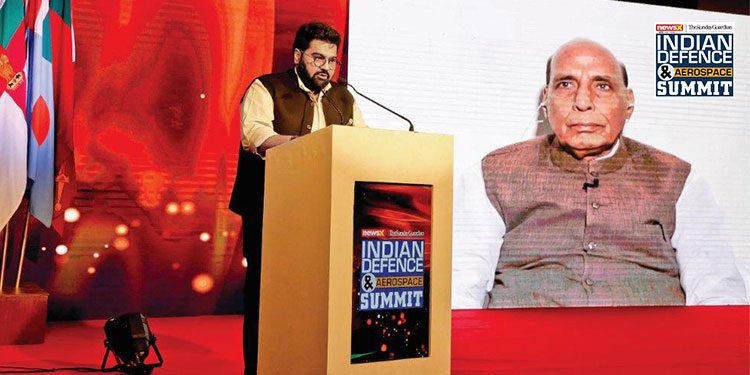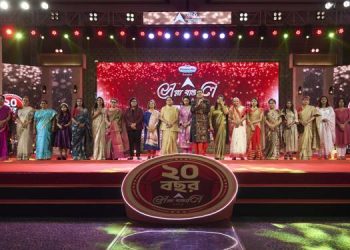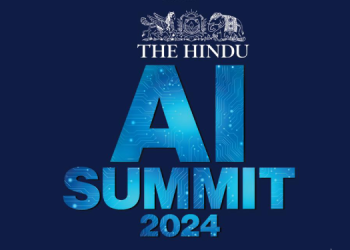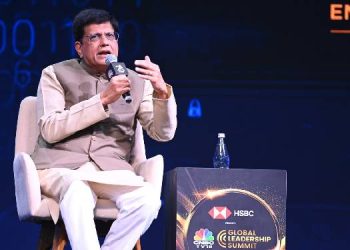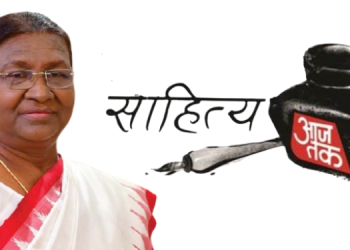New Delhi: NewsX and The Sunday Guardian, India’s finest Sunday newspaper, organised a major Aerospace Summit on 19 October involving the vibrant Indian Defence sector. The Summit provided a platform for key discussions pertaining to the growth of the defence, naval and aviation sectors. The Summit also explored modern themes such as the increasing use of Artificial Intelligence in such areas and the potential that lies within these techniques and exploring the importance of Indian ties with countries such as France, Russia, Israel and Afghanistan.
The Summit, held at Lalit Hotel in Delhi, was graced by the presence of many leaders who have contributed to the progress of the Indian Defence sector, including Rajnath Singh, Defence Minister of India, and General Bipin Rawat, Chair of COSC (Chiefs of Staff Committee). Upon arrival, they were welcomed by Kartikeya Sharma, Founder and Promoter of iTV Network, with an inaugural speech. Following the speech, Rajnath Singh said that Integrated Goods and Service Tax (IGST) has been lowered on defence procurement and customs duty has been exempted on defence equipment. Understanding the importance of the involvement of the private sector in defence development, he said that talent and testing facilities have been opened for the private sector and the government is always open to new ideas suggested by the private sector in New India.
His insightful approach was highlighted when he said that the Central government led by Prime Minister Narendra Modi believes in “minimum government, maximum governance”. He said that India has achieved Rs 80,000 crore of the Rs one lakh crore which is the target for defence production in India. He also said that in order for the defence sector to be self-independent, the import of weapons needs to be reduced. He commended the hard work done and the vision of the Centre, adding that two defence corridors have been announced in Uttar Pradesh and Tamil Nadu. These corridors will further boost local industry.
General Bipin Rawat said that the Indian Army will tap local resources and talent available in the country. Applauding the “Make in India” initiative, he said it helps in minimising defence expenditure. On the battle to eradicate terrorism, he said that terrorism poses new challenges to global and national security. He said that harsh and fluctuating weather conditions pose challenges for the army. Discussing the importance of defence ties between India and the UK, General Bipin Rawat suggested that India and UK armies can collaborate and share technologies to fight terrorism. Hinting at Pakistan’s grim situation involving terrorism and defence, he said that being in the Financial Action Task Force’s (FATF) grey list should be a matter of concern for any country. In a veiled attack on Pakistan, he spoke about how countries which harbour terror never agree on a definition of terror.
The event commenced with a skull session that tackled the profound topic of capacity-building for the forces and future security challenges, along with discussing the importance of Indo-UK military ties. Since there are advances being made all over the world, countries and their leaders have made defence as one of the biggest agendas of all times. Since it is both an intermediate and global affair, the presence of leaders from different countries and areas of defence is crucial to gain perspective. Admiral Tim Fraser CB, Vice Chief of Defence Staff, UK, hailed the professionalism and valour of the Indian armed forces and said that “we are witnessing the period of persistence and competition”. He said that there is a need to engage small, specialised business for game-changing capabilities.
Along with Sir Dominic Asquith KCMG, British High Commissioner to India, sharing his wise words, he said that the UK turning a blind eye to terrorism is not true and that it is very much committed to eliminating terrorism at any cost. Hinting to the hardships caused because of Brexit, he said that despite Brexit hurdles, international trade has increased and India tops the chart. He also pointed out to the evidence, saying that over 3,000 companies have invested in India and they pay taxes worth $1 billion. Addressing the influx of university students in the UK and the massive number of opportunities offered to them, he said that in the last three years, UK has doubled the number of student visas.
Representing the Indian Army and Defence team, Lieutenant General M.M.Naravane was present. He said that the Indian defence sector is at the cusp of major transformation and that there is scope for export of Made in India defence hardware as our friends and neighbours need them. Talking about the unlimited possibilities of the Make in India initiative, he said that Make in India should not be seen as an exercise to manufacture defence equipment only.
As the sessions progressed, the panel focussed on modernisation and opportunities for public private stakeholders. Lieutenant General S.S.Hasabnis, Deputy Chief Army, said AGDPI (Additional Directorate General of Public Information) issued statements on the internet to make the public aware of the requirements of the armed forces. The importance of HAL (Hindustan Aeronautics Limited) was showcased when Air Marshal Sandeep Singh, Deputy Chief, Indian Air Force, correctly said that HAL has created several industries around Nashik to boost indigenisation. Rear Admiral Sanjay Vatsayan, Assistant Chief of Naval Staff (Policy & Plans), said that in the past eight to nine years, 80% contracts related to safety and defence have been given to Indian industries. Retired Lieutenant General Subrata Saha was also present and moderated this session eloquently.
The strategic partnership between India and France was analysed by Emmanuel Lenain, Ambassador of France to India, who said that ties between India and France are growing rapidly. He said that France prioritises the Make in India initiative and France is fully ready to contribute and support the modernisation of the Indian armed forces. He said efforts are being made to bolster ties in the field of cyber security and space technology.
The question of “How can India fill the gap of 200+ fighter jets” was accurately answered by Dr Ajay Kumar, Defence Secretary. He said that the Indian defence sector has risen by 20% in the last few years and that India needs to focus on the development of defence technology, since that is the driving force. He added that defence expos and air shows have become platforms to showcase India’s expertise in aerospace technology.
The advancements and evolution of ties between India and Russia along with artificial intelligence and big data analytics, and the roles that they play in defensive strategies and in reducing global warming, are evidently noticeable. Roman Babushkin, Charge d’Affaires, Russia, said that 140 defence items, including AK-104 riffles, will be manufactured in India to boost the Make in India initiative. He also recognised Russia’s help in India in establishing the Kudankulam N-reactor to reduce New Delhi’s carbon footprints. He promised that Russia will supply India its modern S-400 anti-missile system soon.
India’s strategic partnership with other strong nations and defence acquisition was further discussed with the help of leaders such as Brigadier Gavin Thomson from UK, Colonel Ludovic Dumont from France, Captain Daniel Fillion from USA, Colonel Assaf Mahler from Israel and Captain Simon Bateman from Australia. Captain Daniel Fillionsaid that the USA is willing to work with India as there is professional, organised structure for defence partners. Colonel Assaf Mahler said that the Make in India initiative is good for both, India and Israel. Adding to that he mentioned that India needs to make investors believe that it is worth investing here. Acknowledging India’s superiority in terms of defence and technology, Captain Simon Bateman said that India is much ahead in defence technology; Australian companies need to be made aware of the Make in India initiative.
Exploring the increasing importance of good defence relations between India and Afghanistan, Tahir Qadiry, Charge d’ Affaires, Afghanistan, said that ties between India and Afghanistan are deeply rooted, sharing history, culture, cricket and others. He proudly mentioned the fact that Afghanistan signed its first blueprint strategy with India in 2011 and hailed the Indian government. Bilateral trade between India-Afghanistan in 2017 was for $1 billion, which extended by 48% in the next six months, he mentioned. Talking about the one sport that unites both India and Afghanistan, he said that cricket stadiums in Noida and Dehradun for Afghanistan team are much appreciated. He commended India’s efforts by saying that India showed belief in Afghanistan’s democracy and helped in overcoming several challenges. He praised the Indian government’s dedication to education and the youth, stating that India gives scholarships to over 1 lakh students every year. Applauding the vigour of the youth, he said that 60,000 Afghan students who passed out of Indian colleges have joined ministerial and top posts in the government.
In order to dissect the good relations between India and Israel, Dr Ron Malka was present on the stage and said that a wide range of cooperation is strengthening relations between India and Israel. Understanding that terrorism is not just a personal but a global threat, he said that global terrorism requires a global solution. Mentioning Israel’s dominance in terms of cyber tech, he said that Israel is the leader in cyber security technology. Pressing on the importance of Israel-India ties, he said that working and sharing with India are part of a big vision.
Admiral KarambirSingh, Chief of the Naval Staff, talked about Indian Navy’s focus on methods of naval navigation, naval capability and industrial opportunities, saying that the Indian Navy is focused on capabilities rather than counting the number of vessels. Keeping in view the geo-political situation, India has the potential to emerge as a regional ship-building hub, he said. Adding to his praise of the direction that Indian Navy is going in, he said that the Indian Navy is capable of operating in all formats of naval combat situations. Giving credit to indigenous methods, he said that 17% of the Navy’s budget is spent on indigenous sourcing and Indian Navy. Boasting about the Navy’s capabilities, he said that 26-storey naval ships can power half of Mumbai city. He emphasised the fact that the Navy wants to optimise the budget. Shipbuilding should be seen as an investment rather than as expenditure, he said.

Key officials responsible for the functioning of various divisions of air defence were also present, including Marshal R.K.S. Bhadauria, Chief of the Air Staff. On opportunities present for public and private stakeholders in the need for over 200 jets by the Indian Air Force, he said that LCA mark-2 will be a reality, and IAF is looking for 10 squadrons. He expressed the IAF’s support to the AMCA (Advanced Medium Combat Aircraft) and DRDO (Defence Research and Development Organisation). Mentioning the troubling fact that aero engine development remains a key challenge, the AMCA project may suffer. Advising the private sector, he said that stealth technology is absolutely new for the Air Force and the private sector should focus on it. He stressed on the fact that indigenous engine development is a must in the next 15 years. Hinting to the progressive approach of the IAF, he said that the IAF has made significant progress in the field of electronics and also rapid progress in the field of electronic warfare, communication and data link.
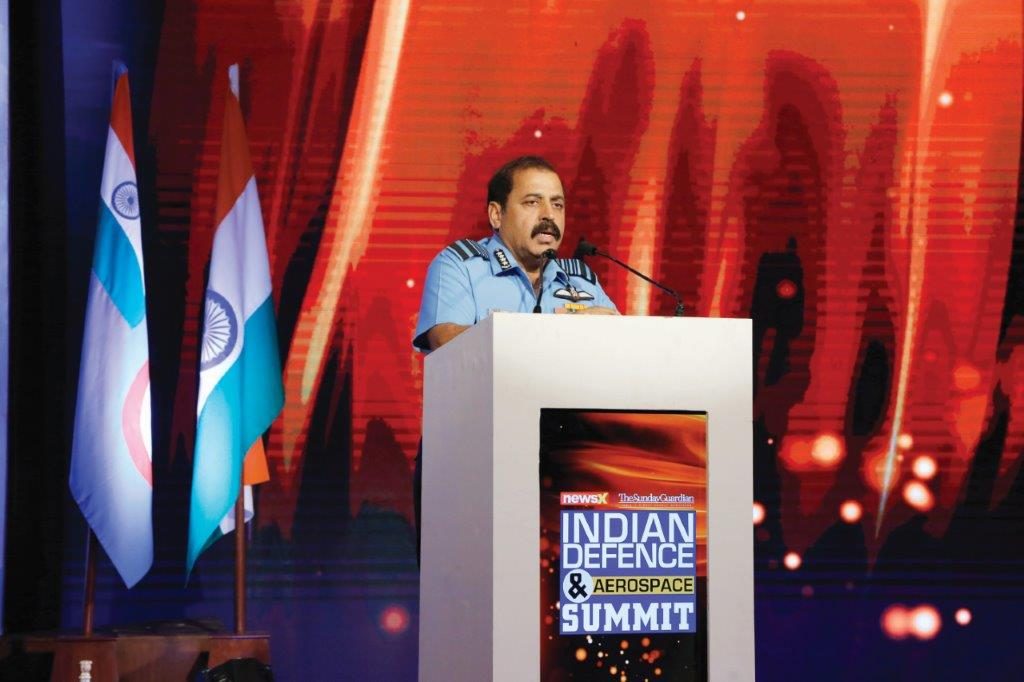
After an extensive and eventful day of discussing various defence strategies and exploring the importance of the bond between India and other strong nations, the event ended with a memorable hint of admiration and veneration in the air, a mutual respect for how far the countries, especially India, have come in terms of the forces of the Army, Navy and Air Force. Emphasising on the Make in India initiative, Defence Minister Rajnath Singh said that the government is encouraging participation from Indian industries. Keeping in mind the necessity and dependence on technology, he said that the country should go ahead with the development of indigenous technologies. Praising the timing of the event, he felt that the Aerospace Summit was a timely step in the right direction.

